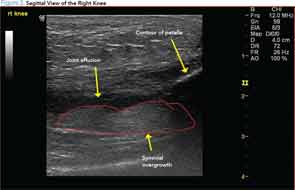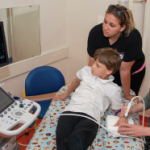I suggest that, in patient-oriented medicine, patients’ perceptions of MSUS results may promote its expanded use. The images are confusing at first, but with minimal on-the-spot education, the scans can help patients visualize and understand key clinical concepts of their disease process, such as abnormal joint effusion or enlargement (see Figure 2).
Some rheumatologists are critical of ultrasound’s use and doubt the tool will gain broader future acceptance. There are indeed valid concerns with regard to insurer payment, lack of support for training and inter-reader scanning reliability.2
The appropriateness of allocating time for US scanning during fellowship training has been questioned. Arguably, the additional minutes could be put to more beneficial use developing more detailed chart review, better joint examination or other visit-related, patient-oriented activities. Presently, the best response to these concerns is unknown, and only time will tell how rheumatologists adapt to the new practice environment.
Why Ultrasound Is Important
On the other hand, researchers have accumulated evidence of improved detection of synovitis using US while assessing inflamed joints of patient with rheumatoid arthritis and ensuring greater precision when injecting selected joints.4,5
My own experience with ultrasound has allowed me to detect synovial fluid with certainty, better direct the injection needle, accurately diagnose shoulder pathology on the spot and immediately share what I saw with the patient.
MSUS is a great tool for both the practitioner and the patient. It has a great future in our specialty.
Katarzyna Gilek-Seibert, MD, is a second-year rheumatology fellow at UTSW Medical Center in Dallas.
References
- Nelson EC, Larson CO, Davies AR, et al. The patient comment card: A system to gather customer feedback. QRB Qual Rev Bull. 1991;Sep;17(9):278–286.
- Samules J, Abramson SB, Kealey GS. The use of musculoskeletal ultrasound by rheumatologists in the United States. Bull NYU Hosp Jt Dis. 2010;68(4):292–298.
- Whorton Marketing and Research. 2010 musculoskeletal ultrasound research: Training directors survey (Nov. 23–Dec. 10, 2010). Survey: American College of Rheumatology MSUS Certification Task Force; 2010.
- Szkudlarek M. Interobserver agreement in ultrasonography of the finger and toe joints in rheumatoid arthritis. Arthritis Rheum. 2003 Apr;48(4):955–962.
- Lawson A, Kelsberg G, Safranek S. Clinical inquiry: Does ultrasound guidance improve outcomes for steroid joint injections? J Fam Pract. 2013 Dec;62(12):763a–763c.

